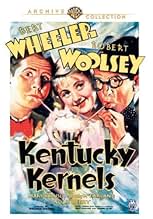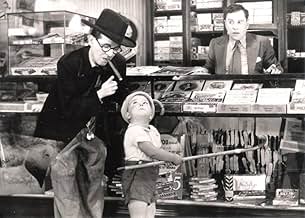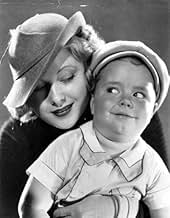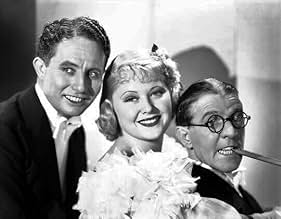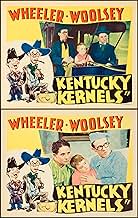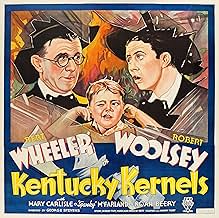Füge eine Handlung in deiner Sprache hinzuTwo out-of-work magicians help lovelorn Jerry adopt little Spanky. When Jerry makes up and elopes, the duo are stuck with the brat. Then Spanky inherits a fortune, so they all head to Kentuc... Alles lesenTwo out-of-work magicians help lovelorn Jerry adopt little Spanky. When Jerry makes up and elopes, the duo are stuck with the brat. Then Spanky inherits a fortune, so they all head to Kentucky and get caught between two feuding clans.Two out-of-work magicians help lovelorn Jerry adopt little Spanky. When Jerry makes up and elopes, the duo are stuck with the brat. Then Spanky inherits a fortune, so they all head to Kentucky and get caught between two feuding clans.
George 'Spanky' McFarland
- Spanky Milford
- (as 'Spanky' McFarland)
Lucille La Verne
- Aunt Hannah Milfor
- (as Lucille LaVerne)
Willie Best
- Buckshot
- (as Sleep 'n' Eat)
Harry Bernard
- Destitute Man
- (Nicht genannt)
Edgar Dearing
- Policeman
- (Nicht genannt)
Jack A. Goodrich
- Double
- (Nicht genannt)
William Gould
- One of the Milfords
- (Nicht genannt)
Dorothy Granger
- Ethel - Baxter's Secretary
- (Nicht genannt)
Empfohlene Bewertungen
If you only know the little bruiser Spanky McFarland from his Litlte Rascals, this movie casts some light on why he was considered one of the best child actors of his generation. As an adorable little tyke with a penchant for breaking glass, he drives the movie's Kentucky feud storyline. He even signs a love song "One Little Kiss," to his best pal -- a cute dog, and one of the male leads sings a few lines to a donkey (It's that kind of movie).
Kentucky Kernels is notable for showing what was considered funny -- and in some cases, socially acceptable -- in 1934. An actor credited as "Sleep n Eat" (actually Willie Best) shuffles his way through the film as a stereotypical wide-eyed, scared-of-his-shadow servant. And a gay subtext between the two male leads is watered down by some forced and unconvincing romance with a typical blonde Southern belle, but lots of the movie's humor is derived from the male/male "romance." In their first scene, for example, Bert Wheeler and Robert Woolsey are the picture of domestic bliss -- bickering as one sits at the dinner table while the other does dishes and complains about his dishpan hands. Though they mince their ways through the rest of the movie, even holding hands at times, the characters are presented as heterosexual. At another point, they're shown sleeping in the same bed -- in a plantation mansion that surely had plenty of bedrooms.
The plot, with the boys finding themselves in the middle of a Hatfileds and McCoys-style Kentucy feud, is a bit contrived. Lines like "You dance exactly like a heifer -- I mean a zephyr!" seem lifted from the Marx Brothers, and in fact one of the supporting players is best known for her appearances as the straight woman in some Marx classics. Margaret Dumont plays the manager of an adoption agency that places young Spanky, indirectly, in the care of the vaudeville performers played by Wheeler and Woolsey. It's a shame Dumont wasn't given a more substantial part; she would have been terrific as a befuddled Southern matriarch later in the film.
The paper-thin plot won't really hold your attention, but viewed as a "film history" lesson, it's worth watching. Director George Stevens went on to much bigger and better things (including the enormous classic, Giant, also set in the South), so it's interesting to see how he handled this dull script.
Kentucky Kernels is notable for showing what was considered funny -- and in some cases, socially acceptable -- in 1934. An actor credited as "Sleep n Eat" (actually Willie Best) shuffles his way through the film as a stereotypical wide-eyed, scared-of-his-shadow servant. And a gay subtext between the two male leads is watered down by some forced and unconvincing romance with a typical blonde Southern belle, but lots of the movie's humor is derived from the male/male "romance." In their first scene, for example, Bert Wheeler and Robert Woolsey are the picture of domestic bliss -- bickering as one sits at the dinner table while the other does dishes and complains about his dishpan hands. Though they mince their ways through the rest of the movie, even holding hands at times, the characters are presented as heterosexual. At another point, they're shown sleeping in the same bed -- in a plantation mansion that surely had plenty of bedrooms.
The plot, with the boys finding themselves in the middle of a Hatfileds and McCoys-style Kentucy feud, is a bit contrived. Lines like "You dance exactly like a heifer -- I mean a zephyr!" seem lifted from the Marx Brothers, and in fact one of the supporting players is best known for her appearances as the straight woman in some Marx classics. Margaret Dumont plays the manager of an adoption agency that places young Spanky, indirectly, in the care of the vaudeville performers played by Wheeler and Woolsey. It's a shame Dumont wasn't given a more substantial part; she would have been terrific as a befuddled Southern matriarch later in the film.
The paper-thin plot won't really hold your attention, but viewed as a "film history" lesson, it's worth watching. Director George Stevens went on to much bigger and better things (including the enormous classic, Giant, also set in the South), so it's interesting to see how he handled this dull script.
A zany Vaudeville magician & his assistant become KENTUCKY KERNELS when they try to return a small boy to his rightful inheritance down in Plantation Country. What they don't realize is that they're walking right into the hottest feud in the Kentucky Hills...
Wheeler & Woolsey are in top form in this funny comedy (Bert Wheeler is the short guy with curly hair; Robert Woolsey is the fellow with the spectacles & cigar.) Although largely forgotten today, they were often hilarious and always fun to watch. This time they are given powerful support from little Spanky McFarland, of the OUR GANG series, one of the greatest of all child stars. Spanky, with his penchant for glass breaking, fits right in with the goofiness that abounds in all W & W films.
What there is of the plot is simply meant to move the gags along, although opening with an attempted suicide is a bit heavy. The romantics this time - between Wheeler & Mary Carlisle - is particularly thin. Others in the cast are basso villain Noah Beery; elderly Lucille La Verne (memorable a few years later as the voice of the Witch Queen in Disney's SNOW WHITE); and always funny Willie Best, here acting under his nickname of Sleep n' Eat. The monumental Margaret Dumont is given little to do in her few scenes; one longs to see her cast as Woolsey's foil.
The Boys - all of them - sing `One Little Kiss'.
Wheeler & Woolsey are in top form in this funny comedy (Bert Wheeler is the short guy with curly hair; Robert Woolsey is the fellow with the spectacles & cigar.) Although largely forgotten today, they were often hilarious and always fun to watch. This time they are given powerful support from little Spanky McFarland, of the OUR GANG series, one of the greatest of all child stars. Spanky, with his penchant for glass breaking, fits right in with the goofiness that abounds in all W & W films.
What there is of the plot is simply meant to move the gags along, although opening with an attempted suicide is a bit heavy. The romantics this time - between Wheeler & Mary Carlisle - is particularly thin. Others in the cast are basso villain Noah Beery; elderly Lucille La Verne (memorable a few years later as the voice of the Witch Queen in Disney's SNOW WHITE); and always funny Willie Best, here acting under his nickname of Sleep n' Eat. The monumental Margaret Dumont is given little to do in her few scenes; one longs to see her cast as Woolsey's foil.
The Boys - all of them - sing `One Little Kiss'.
Bert Wheeler and Robert Woolsey get themselves stuck with little Spanky McFarland. They're a couple of itinerant magicians and the last thing they need is a kid. But this might be a pot of gold because Spanky just could be the heir of the Milford estate in Kentucky.
But what the boys don't know is that in passing themselves off as Milfords as well, they're inheriting an old mountain feud with another clan called the Wakefields. Made even worse by the fact that poor Bert has fallen for Mary Carlisle the daughter of Wakefield family patriarch Noah Beery, Sr.
The boys are pretty resourceful though and the last twenty minutes or so with them, Willie Best and Spanky holding off a horde of Wakefields is pretty funny. Sad to say though that Willie Best's portrayal of Buckshot probably keeps Kentucky Kernels from having been shown too much on television for years.
Although Kentucky Kernels is funny, I'd see Abbott&Costello's Comin' Round the Mountain. A similar story without the racism.
But what the boys don't know is that in passing themselves off as Milfords as well, they're inheriting an old mountain feud with another clan called the Wakefields. Made even worse by the fact that poor Bert has fallen for Mary Carlisle the daughter of Wakefield family patriarch Noah Beery, Sr.
The boys are pretty resourceful though and the last twenty minutes or so with them, Willie Best and Spanky holding off a horde of Wakefields is pretty funny. Sad to say though that Willie Best's portrayal of Buckshot probably keeps Kentucky Kernels from having been shown too much on television for years.
Although Kentucky Kernels is funny, I'd see Abbott&Costello's Comin' Round the Mountain. A similar story without the racism.
Kentucky Kernels (1934)
*** (out of 4)
George Stevens directs this Wheeler and Woolsey film where the two take an adopted boy (Spanky from Our Gang) back to his relatives in Kentucky but soon finds themselves in a feud between two families. It's been hit and miss with me and these W&W films but this one here is clearly the best I've seen. The comedy ranges towards jokes about rednecks and some rather politically incorrect stuff but the duo brings some great comic timing and the added bonus of Spanky makes this a damn good comedy. There's some wonderful gags including a horse accidentally drinking moonshine and another scene where W&W try and talk themselves out of a speeding ticket. The jokes aimed at the Southern families work very well and Spanky steals the show with each scene that he's in. The running joke is that he likes to break windows so there's plenty of that going on. There's also a large shoot out at the end, which looks to have more bullets flying than any of Warner's gangster pictures. The film borrows a lot of Keaton's Our Hospitality but works well on its own.
*** (out of 4)
George Stevens directs this Wheeler and Woolsey film where the two take an adopted boy (Spanky from Our Gang) back to his relatives in Kentucky but soon finds themselves in a feud between two families. It's been hit and miss with me and these W&W films but this one here is clearly the best I've seen. The comedy ranges towards jokes about rednecks and some rather politically incorrect stuff but the duo brings some great comic timing and the added bonus of Spanky makes this a damn good comedy. There's some wonderful gags including a horse accidentally drinking moonshine and another scene where W&W try and talk themselves out of a speeding ticket. The jokes aimed at the Southern families work very well and Spanky steals the show with each scene that he's in. The running joke is that he likes to break windows so there's plenty of that going on. There's also a large shoot out at the end, which looks to have more bullets flying than any of Warner's gangster pictures. The film borrows a lot of Keaton's Our Hospitality but works well on its own.
Willie Doyle (Bert Wheeler) and Elmer Dugan (Robert Woolsey) are out-of-work magicians. They are The Great Elmer and Company. They help Jerry Bronson adopt Spanky Milford, but Jerry elopes with his girlfriend leaving Spanky behind with the two magicians. Then they are told that Spanky has inherited a large estate. The trio head out to Banesville, Kentucky. At the train station, Willie and fellow passenger Gloria Wakefield (Mary Carlisle) fall for each other. Unbeknownst to the guys, the Milfords and Wakefields are embroiled in a generational blood feud.
Initially, I am amused by Wheeler and Woolsey and the kid. The kid is a bit too bratty and not quite cute enough. The glass breaking is a funny gag at first, but it gets more annoying over time. The guys never really get beyond mildly amusing. I don't hate these guys, but I'm not really laughing either.
Initially, I am amused by Wheeler and Woolsey and the kid. The kid is a bit too bratty and not quite cute enough. The glass breaking is a funny gag at first, but it gets more annoying over time. The guys never really get beyond mildly amusing. I don't hate these guys, but I'm not really laughing either.
Wusstest du schon
- Wissenswertes"RKO" borrowed George 'Spanky' McFarland from "Hal Roach Studios" for this film.
- VerbindungenFeatured in Hollywood the Golden Years: The RKO Story: Birth of a Titan (1987)
- SoundtracksOne Little Kiss
(1934) (uncredited)
Written by Bert Kalmar, Harry Ruby
Performed by Bert Wheeler, Noah Beery, George 'Spanky' McFarland,
Robert Woolsey, Mary Carlisle and negro servants
Top-Auswahl
Melde dich zum Bewerten an und greife auf die Watchlist für personalisierte Empfehlungen zu.
Details
- Erscheinungsdatum
- Herkunftsland
- Sprache
- Auch bekannt als
- Kentucky Corn
- Drehorte
- Produktionsfirma
- Weitere beteiligte Unternehmen bei IMDbPro anzeigen
- Laufzeit1 Stunde 15 Minuten
- Farbe
- Seitenverhältnis
- 1.37 : 1
Zu dieser Seite beitragen
Bearbeitung vorschlagen oder fehlenden Inhalt hinzufügen

